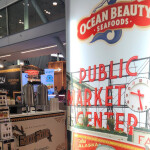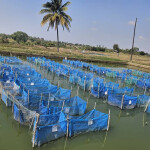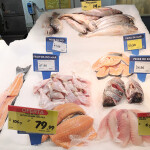Opening last week’s 9th International Forum on Illegal, Unreported and Unregulated (IUU) Fishing in London, Sherry Ayittey, minister of fisheries and aquaculture development for the Republic of Ghana, said solving IUU fishing was “one of the greatest challenges of our time,” as it is responsible for some of the most severe problems affecting world fisheries and one of the biggest obstacles that stands in the way of achieving sustainability.
Ayittey reminded forum delegates that apart from the environmental and economic costs, it’s also globally agreed that IUU fishing and associated maritime crimes have huge social implications and present significant security-related issues, especially in developing countries. And yet in spite of the increased awareness of the multiple implications of illegal fishing, as well as the market actions that have resulted from the EU’s IUU Regulation and “no shortage of monitoring and surveillance tools in response to IUU,” the minister stressed that global communities are yet to find a lasting solution to the problem.
According to Simon Reddy, executive secretary of the Global Ocean Commission, this failing lies with a lack of sustained international cooperation and commitment to tie everything together, but that “the tools” – agencies, agreements etc. – for tackling IUU are “all there.”
Reddy explained that IUU fishing is a very important area for the Commission, which comprises business leaders, former heads of state and government ministers, who together provide international recommendations to tackle declines on the high seas. In looking at ways to address the problem, it focused on three areas, bringing a number of measures together – at sea, in the port, and at market.
At sea, the Commission has recommended mandatory International Maritime Organization (IMO) numbers and transponders for fishing vessels so they can be constantly tracked, and at a port level, it wants to see the full implementation of the Port State Measures Agreement (PSMA), which would aim to prevent IUU fishing through robust port state measures.
“Markets is an area we are particularly interested in,” said Reddy, who praised both the United States’ Presidential Task Force on Combating IUU Fishing and Seafood Fraud and the EU’s IUU Regulation for their effectiveness in this regard.
“The fact is Europe and the U.S. account for 40 percent of the global fish market, and they’re at the top of the market. In other words, people will be paid a premium for supplying to those markets, so they are the markets that everyone wants to sell in to.
“As such, retailers and processors have a vital role to play. Many of them are already committed to sustainable sourcing and have adopted effective sustainability systems. But I believe traceability is a real opportunity.”
With fraudulent episodes such as the United Kingdom’s horsemeat scandal still fresh in peoples’ minds, Reddy reckons the “main driver” of sustainable seafood, including traceability, is that a lot of people are prepared to pay extra money for sustainable seafood, but also that “one surefire way of upsetting the consumer” and also losing market share is consumer deceit.
“If your burger turns out to be horsemeat and not beef, as we found out in the U.K., it really does affect your profits and the trust that people put in certain supermarket chains. And so the whole issue of fish fraud and consumer deceit is a compelling argument as to why supermarkets and processors need to be ensuring the safety and the traceability of their supply. The last thing a retailer wants is to be found out for selling cod to people and the fish turns out to be something completely different,” said Reddy.
In addition to ensuring full traceability, the Commission also believes retailers have an opportunity to use the market to further other international agreements. For instance, they could stipulate that all the fish they purchase comes from vessels with IMO numbers and full electronic tracking in place. Some are already doing this, acknowledged Reddy, but said they could also insist that the boats that they are buying from and the countries that those boats are flagged to must have signed the PSMA and are actively monitoring their nationals and their fishing vessels.
“Sometimes I think the market is scared or nervous to get involved in international politics, but for me, they are not getting involved in the actual political negotiation and decision making. All they are doing is reinforcing those decisions through the work they are doing to source their products – knowing that they are safe and secure and they are genuinely the product that they are being sold as,” he said.
Andy Hickman, responsible sourcing manager at Tesco, assured delegates that the U.K. market’s biggest retailer considers tackling IUU to be a “big priority,” because it needs to provide guarantees to its customers that the fish they are being sold is caught in compliance with all applicable laws and regulations.
“Mitigating the risk of IUU in our supply chain is a priority at the very highest levels of our business and we see our role as working collectively toward sector-wide solutions. That means not just working on our supply chain, but with the fisheries sector as a whole.
“Different fisheries in different countries are at different stages of this journey,” said Hickman. “But from the perspective of legal certainty, the perspective of security of supply, and indeed from a commercial perspective, we want to be sourcing from fisheries where there is a culture of compliance.”
This commitment to sourcing only legal fish, he added, should transcend any commercial sensitivity with regard to prices.
“This cannot be about price. In the same way that we have to make sure that the fish we provide our consumers with is safe to eat from a hygiene perspective, we absolutely have to make sure that the fish we sell them is legal. This starts with making sure our supplier agreement specifications are clear about our requirements and these are adhered to irrespective of the strength of local importance, but we definitely don’t stop there. We work with our suppliers on comprehensive due diligence and traceability checks and we work both with specific strategic suppliers on this but also through multi-stakeholder initiatives.”
Moving forward, Hickman said Tesco stands ready to work with the EU, third-countries and alongside its suppliers to play a supportive role in the implementation of the IUU Regulation. He also disclosed that he would take three key messages back to “the business” from the forum: Firstly, the increasing need to engage beyond its supply chain; next, the importance of supporting international agreements such as the PSMA; and last nut not least, the theme of transparency.
Because the introduction of the PSMA is “about much more than just signing an agreement,” he revealed Tesco would now work on establishing where the countries of all its suppliers are on the agreement’s ratification and where capacity constraints may exist. It would then identify opportunities for playing an advocacy role in its application.
“The development of a global record of fishing vessels is a big priority for us; we see it as a very valuable tool for the seafood sector. I think there is a key role there for NGOs to help us understand where the transparency deficits exist and how we as a stakeholder, along with others, can help to address them.
“I believe confronting IUU is going to be much more about cooperation and collaboration than it is about competition,” said Hickman.






